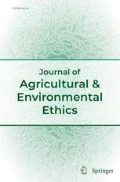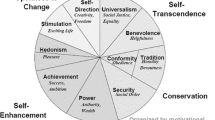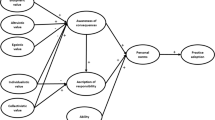Abstract
An experimental survey was undertakento explore the links between thecharacteristics of a moral issue, the degree ofmoral intensity/moral imperative associatedwith the issue (Jones, 1991), and people'sstated willingness to pay (wtp) for policy toaddress the issue. Two farm animal welfareissues were chosen for comparison and thecontingent valuation method was used to elicitpeople's wtp. The findings of the surveysuggest that increases in moral characteristicsdo appear to result in an increase in moralintensity and the degree of moral imperativeassociated with an issue. Moreover, there was apositive link between moral intensity/moralimperative associated with an issue andpeople's stated wtp for policy to address theissue. The paper discusses the relevance of thefindings of the survey in the context of thedebate concerning the relationship betweenmoral and economic values and the use of thecontingent valuation method to estimatepeople's wtp of policy options with moraldimensions.
Similar content being viewed by others
REFERENCES
Andreoni, J., “Impure Altruism and Donations to Public Goods: A Theory of Warm-Glow Giving,” The Economic Journal 100 (1990), 464–477.
Arrow,K., R. Solow, P. R. Portney, E. E. Leamer, R. Radner, and H. Schuman, Report of the US National Oceanic and Atmospheric Administration Panel on Contingent Valuation. Resources for the Future. (Washington, DC January 11, 1993).
Bennett, R. M., “Economics,” in M. C. Appleby and B. O. Hughes (eds.), Animal welfare (New York: CAB International, 1997).
Bennett, R. M., “Measuring Public Support for AnimalWelfare Legislation: A Case Study of Cage Egg Production,” Animal Welfar 7 (1998), 1–10.
Bennett, R. M. and D. Larson, “Contingent Valuation of the Perceived Benefits of Farm Animal Welfare Legislation: An Exploratory Survey,” Journal of Agricultural Economics 47 (1996), 224–235.
Bentham, J., Introduction to the principles of morals and legislation. 1996 Imprint (Clarendon Press, Oxford, 1789).
Boulding, K. E., “Economics as a Moral Science,” The American Economic Review 59 (1969), 1–12.
Carruthers, P., The Animals Issue. Moral Theory in Practice (Cambridge University Press, Cambridge, 1992).
Carson, R. T., N. E. Flores, and N. F. Meade, Contingent valuation: controversies and evidence (National Oceanic and Atmosphere Administration US Department of Commerce, Washington DC, 2000).
Carson, R. T., J. L. Wright, N. J. Carson, A. Alberini, and N. E. Flores, A Bibliography of Contingent Valuation Studies and Papers. La Joola (NRDA Inc, CA 1995).
Degrazia, D., “Animal Ethics Around the Turn of the Twenty-First Century,” Journal of Agricultural and Environmental Ethics 11 (1999), 111–129.
Durant, J., “Do not be Afraid of Democracy,” Research Fortnight 25 (February, 1998).
Fraser, D., Animal Ethics and Animal Welfare Science: Bridging the Two Cultures. The D.G.M. Wood-Gush Memorial Lecture (Animal Welfare Program, Faculty of Agricultural Sciences and Applied Ethics, University of British Colombia, Vancouver, 2000).
Frey, R. G., Interests and Rights: The Case Against Animals (Oxford University Press, Oxford, 1980).
Jones, T. M., “Ethical Decision Making by Individuals in Organisations: An Issue-Contingent Model,” Academy of Management Review 12 (1991), 366–395.
Kahnemann, D. and J. Knetsch, “Valuing Public Goods: The Purchase of Moral Satisfaction,” Journal of Environmental Economics and Management 22 (1992), 57–70.
Mepham, B. (ed.) Food Ethics (Routledge, London, New York, 1996).
McInerney, J. P., Animal Welfare: An Economic Perspective. Paper presented at the Agricultural Economics Society Conference (Oxford, UK, 1993).
Milgrom, P., “Is Sympathy an Economic Value? Philosophy, Economics and the Contingent Valuation Method,” in J. A. Hausman (ed.), Contingent Valuation: A Critical Assessment (Elsevier, Amsterdam, 1993).
Mitchell, R. C. and R. T. Carson, Using Surveys to Value Public Goods. The Contingent Valuation Method (Resources for the Future, Washington DC, 1989).
Morris, S. A. and R. A. McDonald, “The Role of Moral Intensity in Moral Judgments: An Empirical Investigation,” Journal of Business Ethics 14 (1995), 715–726.
Pluhar, E. B., Beyond Prejudice: The Moral Significance of Human and Nonhuman Animals (Duke University Press, Durham, 1995).
Regan, T., The Case for Animal Rights (Routledge, London, 1984).
Regan, T. and P. Singer (eds.), Animal Rights and Human Obligations. Second Edition. Englewood Cliffs (Prentice Hall, NJ, 1989).
Rodd, R., Biology, Ethics and Animals (Clarendon Press, Oxford, 1990).
Rollin, B. E., Animal Rights and Human Morality. Revised Edition (Prometheus Books, New York, 1992).
Ryder, R. D., Animal Revolution: Changing Attitudes Towards Speciesism (rg Publishers, Oxford, 2000).
Sandoe, P., “Animal and Human Welfare – Are They the Same Kind of Thing?” Acta Agriculture Scandinavia Section A, Animal Science Supplementum 27 (1996), 11–15.
Sapontzis, S. F., Morals, Reason, and Animals (Temple University Press, Philadelphia, 1987).
Scanlon, T., “Contractualism and Utilitarianism,” in A. Sen and B. Williams (eds.), Utilitarianism and Beyond (Cambridge University Press, Cambridge, 1982).
Sen, A., “Food Economics and Entitlements,” in J. Dreze and A. Sen (eds.), The Political Economy of Hunger (Clarendon Press, Oxford, 1990).
Singer, P., “All Animals are Equal,” in T. Regan and P. Singer (eds.), Animal Rights and Human Obligations, Second Edition (Prentice Hall, Englewood Cliffs, NJ, 1989), pp. 73–86.
Singer, P., Practical Ethics, Second Edition (Cambridge University Press, Cambridge, 1993).
Spash, C. L., “Multiple Value Expression in Contingent Valuation: Economics and Ethics,” Environment, Science & Technology 34 (2000), 1433–1438.
Statistical Analysis Systems Institute Inc. SAS/STAT Users' Guide Version 6, Fourth Edition (SAS Inc., Cary, NC, USA, 1989).
Velasquez, M. G. and C. Rostankowski, Ethics: Theory and Practice (Prentice-Hall, Englewood Cliffs, NJ, 1985).
Wilkins, D. B. (ed.), Animal Welfare in Europe. European Legislation and Concerns (Kluwer Law International, London, 1997).
Author information
Authors and Affiliations
Rights and permissions
About this article
Cite this article
Bennett, R.M., Anderson, J. & Blaney, R.J.P. Moral Intensity and Willingness to Pay Concerning Farm Animal Welfare Issues and the Implications for Agricultural Policy. Journal of Agricultural and Environmental Ethics 15, 187–202 (2002). https://doi.org/10.1023/A:1015036617385
Issue Date:
DOI: https://doi.org/10.1023/A:1015036617385




